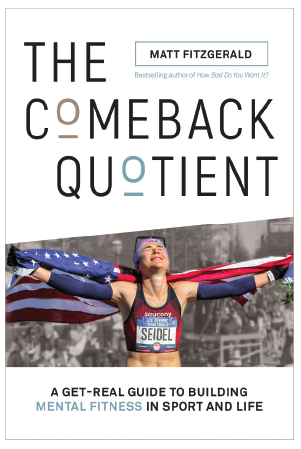It’s a book which could not be timelier for the masses. While its cover may cause some to shy away, ‘The Comeback Quotient’ by Matt Fitzgerald isn’t a book simply about running and fitness.
Located on the cover, just below an image of Olympic Marathon runner Molly Seidel, are the words “A get-real guide to building mental fitness in sport and life,” which could not be truer.
Through the pages of the book, Fitzgerald examines mental fitness through the stories of elite, as well as recreational athletes. He also includes mini chapters in the book documenting his comeback as an Ironman tri-athlete.
“The reason I included that element is because I wanted to show readers that I’m not just peddling this message because I think it sounds good and I can sell a lot of books,” Fitzgerald shared. “I wanted people to recognize that I believe in this stuff to the point that I practice it in my own athletic endeavors, which matters to me. I’m not going to play around with methods that don’t work.”
The “stuff” and “methods” the author speaks of specifically are the mindset of the “ultra-realist” and the application and usage of the mindset to endurance sports.

As the concept is demonstrated through the stories of elite, as well as recreational runners overcoming significant setbacks, the stories are told in such a way that even the non-athlete can learn and benefit from the takeaway.
“Not to say rec athletes don’t have that, some do, some don’t – yet there is a difference,” Fitzgerald further noted.
The concept, as well as title for the book, Fitzgerald shared was presented to him by his editor at VeloPress.
“I’d been wanting to write a book about what is uniquely different about athletes … basically a book that is able to address what is mental fitness and who has it and who doesn’t,” he said. “How do you get it, if they don’t have it.”
The book examines the concept and does for the reader what Fitzgerald does for his one-on-one clients as a trainer.
“I believe these ideas are true. I believe they have relevance for the endurance athlete or anyone who’s trying to come back from some type of adversity,” Fitzgerald stated. “It’s just a matter of how do you connect it in a way which is useful.”
As a long time endurance athlete who happens to earn a living writing books, articles and coaching other athletes, Fitzgerald himself has also found personal occasion to put the concept into practice.
Some might say most recently that would be the case more than ever before.
Just as the book was being released, Fitzgerald began experiencing some physical setbacks.
The writer shared he contracted COVID-19 in March of 2020, early in to the pandemic as well as the testing and diagnosis. Following a month of feeling sicker than he’s ever felt, he slowly began returning to regular activity. By October of 2020 he described having a really bad workout, which led to a series of bad workouts. Research, testing and more research eventually led the lifetime athlete to learn he has Post-Acute COVID-19 Syndrome or Long COVID. It’s an after effect of the virus, which while not “active” or contagious, is very present to the individual living with it.
“It’s sort of like some pain condition,” he said. “It hurts one minute, it doesn’t hurt the next and you can’t completely put your finger on it.
“Some symptoms come and go, some don’t really bother you,” he continued. “Mostly you adapt. There’s no cure. The thing is not fully understood.”
Since learning of his acute illness, the author has drastically changed his daily routine from hours in the gym, cycling and running each week to walking with his wife several days a week.
“Practicing what I preach and the reality of it … accepting the reality of it,” he said of the lessons learned post-COVID. “You know there’s a difference between acceptance and resignation and I am not resigned.”
While not resigned, he is an ultra-realist.
“How okay can I be? How happy can I be? How productive can I be if things don’t get better,” Fitzgerald said. “The virus is gone, but it’s left its calling card and you’re never the same again.”
The author went on to share he’s learned it’s okay to face reality, to admit to being weak and have self-doubt.
“If it’s true, it’s better to put it out on the table,” he said. “You can’t solve a problem, you’re not willing to identify. Being okay with being authentic.”
Applying the ultra-realist concept to his own current chapter of life, Fitzgerald shared, it was surprisingly easy, when he realized he would have to give up running.
“The handwriting was on the wall,” he said.
And now he is moving forward with a positive mindset.
“Comparison is the thief of joy. No matter who you are, be happy to be you,” the ultra-realist concluded. “Your journey can be as fulfilling and exciting and rewarding as any other athlete if you just stop wanting to be that other athlete. Focus on writing the best possible ending to the story that is uniquely yours.”





